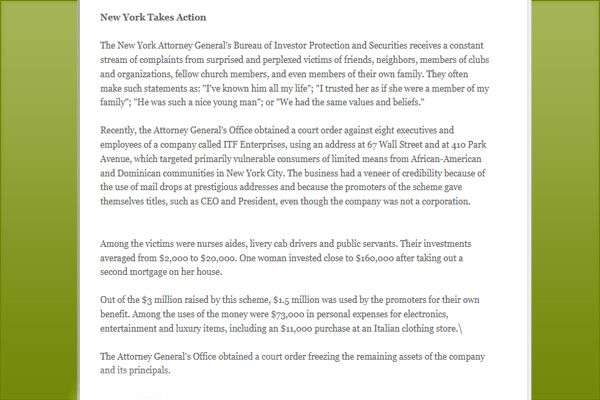Affinity Scams
Scammers operating both within and outside the country play a significant role in swindling the hard-earned money of innocent individuals who use email daily. Affinity-related scams are becoming increasingly widespread across the globe, with hundreds of wealthy and affluent groups targeted by malicious perpetrators in recent years. Affinity fraud is a type of investment scam in which fraudsters, often operating under different aliases, target members of specific communities—such as elderly groups, religious organizations, ethnic communities, and socially affluent circles. These scammers send persuasive emails encouraging recipients to invest money, exploiting the trust and shared identity within these groups.
Affinity scams often target specific groups such as religious communities, employee networks, ethnic communities, or like-minded individuals working within the same organization. Scammers typically present themselves as well-wishers or members of the targeted group to build trust. These fraudsters may send emails urging religious groups to invest money—often funds held in trust—into one of their so-called investment portfolios. Well-informed groups usually ignore such messages or refrain from transferring money. However, groups lacking awareness about scams may fall for the deception and deposit large sums into the scammer's account. Scammers often use manipulative language like, “I’m one of you—you can trust me,” or “Trust my words if you want to double your investment.”
Target groups for affinity scams include religious communities, employee networks, ethnic groups, or like-minded individuals working in the same organization. Scammers often present themselves as members of the targeted group or as well-meaning individuals with the group's best interests at heart. These dishonest con artists may contact religious organizations, urging them to invest idle trust funds into fraudulent investment portfolios. Well-informed groups typically ignore such requests or refrain from making any financial transactions. However, groups lacking awareness of such scams may fall for the deception and immediately transfer large sums of money into the scammers' accounts. Phrases like “I am one of your group, and you can trust my words” or “Trust me if you want to double your investment” are commonly used by these fraudsters to build false credibility.
Examples of scams relating to religious affinity are as follows:
-
Internet Missionaries Church (GMI): The GMI church took $27,000 from over 27,000 believers, promising large returns. However, they swindled the money and vanished without a trace.
Sunday School Teacher Fraud: A Sunday school teacher defrauded church members out of $1 million, which was deposited into his personal account.
Christian Financial Consultant: A former financial consultant who claimed to uphold Christian values was sentenced to several years in prison after swindling $6 million from clients’ accounts.
Oil-Finding Device Scam: A well-known promoter claimed to have invented a device to locate oil and defrauded several religious members out of $1 million.
Prime Bank Investment Scam: Around 125 members of various Christian associations lost approximately $7.4 million when scammers sold them non-existent "prime bank trading" investments.
Armenian-American Community Fraud: Members of the Armenian-American community lost $19 million in what the SEC officially classified as affinity fraud.
African-American Baptist Scam: African-American Baptists, most of whom were elderly, lost $3.5 million to scammers posing as trusted financial advisers.
Affinity scams, also known as "affinity fraud," are fraudulent schemes that target members of specific social, religious, ethnic, or professional groups. Scammers gain trust within these communities by exploiting shared characteristics or affiliations to deceive individuals into investing money or participating in fraudulent schemes. These scams are particularly dangerous because they abuse the inherent trust and camaraderie among group members.
Common Examples of Affinity Scams:
-
Religious Affinity Scams:
Scammers may target members of a particular religious community, using shared faith as a foundation for trust. They often promise high returns on investments or solicit donations for fake religious causes. -
Ethnic or Cultural Affinity Scams:
Fraudsters exploit cultural connections, language, or traditions to gain trust. They may offer investment opportunities, educational programs, or services that appear to support the community. -
Professional Affinity Scams:
Scammers pose as members of a specific profession or industry and target colleagues with promises of exclusive investment opportunities or industry-specific services. -
Social Group Affinity Scams:
These involve scammers infiltrating social circles—often using charisma or personal charm—to promote fraudulent ventures such as pyramid schemes or bogus investments. -
Senior Affinity Scams:
Older adults are often targeted due to their age group. Scammers may offer fake financial products, services, or investments, preying on their vulnerabilities and trust.
To protect against affinity scams, it's important to:
-
Exercise Caution:
Be wary of unsolicited investment offers or services, even if they come from within your social, religious, or professional network. -
Verify Credentials:
Always verify the credentials of individuals or organizations offering financial products or services—even if they are part of your affinity group. -
Research and Investigate:
Conduct independent research on any investment opportunity or service. Seek out unbiased information from trusted and reputable sources. -
Ask Questions:
Don’t hesitate to ask for detailed information about the opportunity. Be cautious of vague, evasive, or overly confident responses. -
Report Suspicious Activity:
If you suspect an affinity scam, report it to the appropriate authorities or regulatory agencies to help prevent others from becoming victims.
Remember: Trust should be based on transparency, proven credibility, and a legitimate track record—not solely on shared affiliations or group membership.







